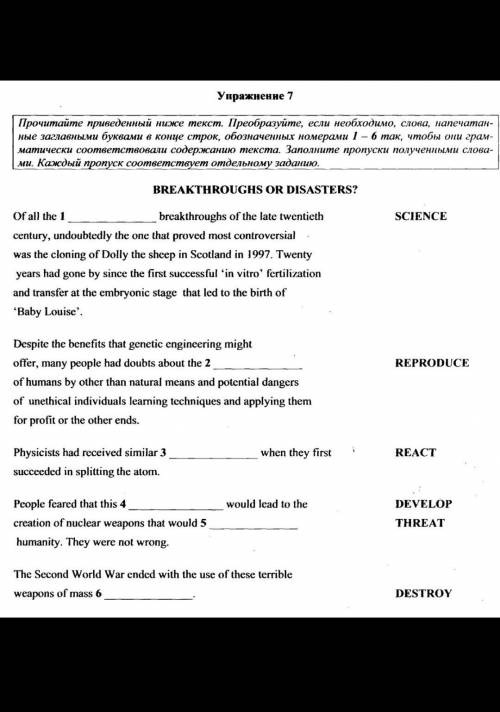BREAKTHROUGHS OR DISASTERS? ответы

Другие вопросы по теме Английский язык
Популярные вопросы
- 10 речень ,,Не з прислівниками ...
2 - Найти Н О Д и Н О К 35 и 42 , 18 и 24 , 396 и 180 ...
3 - из пункта А и Б навстречу друг другу с равной скоростью вышли Кирилл...
1 - (Сделайте лексический анализ ) ЦВЕТУЩИЙ ВИД...
1 - О чём Пётр и Феврония молились, став старыми?...
3 - Приклад етнографічного історичного джерела...
3 - Write 8-10 sentences about the place you live in (location, attractions,...
2 - Гп ятому 11. Установіть відповідність між числівником і його характеристикою.1)...
1 - Я не могу придумать интересную тему для проекта по литературе. Подскажите...
1 - Акпараттын ен улкен бирлиги...
2
1. Discovery of Penicillin:
Breakthrough: The discovery of penicillin by Alexander Fleming in 1928 marked a major breakthrough in medicine. It revolutionized the field of antibiotics, saving countless lives by effectively treating bacterial infections. Penicillin became widely used and formed the basis for the development of modern antibiotics.
2. Invention of the Telephone:
Breakthrough: The invention of the telephone by Alexander Graham Bell in 1876 was a significant breakthrough in communication technology. It revolutionized the way people could connect and communicate over long distances. The telephone became an essential tool for businesses, households, and emergency services.
3. Development of Atomic Bombs:
Disaster: The development and use of atomic bombs during World War II can be considered a disaster due to the massive destruction and loss of life caused by the bombings of Hiroshima and Nagasaki. The devastating long-term effects of radiation also pose a significant risk to human health and the environment.
4. Introduction of Internet:
Breakthrough: The introduction of the internet has transformed the world in numerous positive ways. It has revolutionized communication, information sharing, and access to resources. The internet has significantly impacted industries, education, and social interactions on a global scale, creating countless opportunities for innovation and progress.
5. Chernobyl Nuclear Disaster:
Disaster: The Chernobyl nuclear disaster in 1986 was a catastrophic event caused by a reactor explosion. It released a significant amount of radioactive material, resulting in immediate fatalities and long-term health effects for those exposed. It also led to the evacuation and abandonment of nearby towns and had a severe impact on the environment.
6. Development of Vaccines:
Breakthrough: The development of vaccines, such as the polio vaccine, has been a monumental breakthrough in preventive medicine. Vaccines have played a crucial role in eradicating or reducing the incidence of deadly diseases worldwide. They have saved millions of lives and continue to protect individuals from various infectious diseases.
In conclusion, "Breakthroughs or Disasters?" is a question that evaluates the positive or negative implications of specific events. It is important to assess the historical, social, and scientific context to determine whether an event can be considered a breakthrough or a disaster. Each case requires careful examination of its impact on human life, society, and the environment.